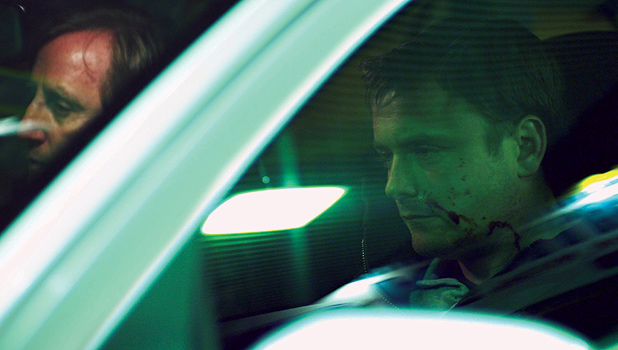I’ve never seen a film like A Field in England before. Newcomer Ben Wheatley’s latest film is his most obscure, surreal and artistic effort to date. It’s a far-cry from the grim realism of Kill List, and will most likely be labelled pretentious by many. After all, this is a black and white 17th century psychedelic war-drama focussed on metaphysical themes that features The League of Gentlemen‘s Reece Shearsmith and Julian Barratt from The Mighty Boosh. I’m sure that after that sentence those who would despise the film outright have run for hills… so let us continue.
The beating of drums, horns being blown and shuffling feet: these are the sounds that open A Field in England, along with some ambient bass notes. England is in the grip of civil war, but this film does not plan on delving into historical realism… We are introduced to Whitehead (Shearsmith), a somewhat apprehensive and cowardly alchemist’s apprentice who is trying to desert the scene of a raging battle. Julian Barratt as a staunch cavalry commander is shouting after him, using a barrelful of expletives, before he is speared through the chest and dies pointing at Whitehead with a maniacal and accusatory look. So, Julian Barrett is dead, two minutes in!? He was a lead character according to the credits! Oh, don’t worry, in this film, just because someone has been savagely killed, doesn’t stop them from coming back…
Whitehead walks along the hedgerow to find a rag-tag bunch of deserters, who convince him to traipse across the countryside with them in search of the nearest inn. This is the simple premise of A Field in England, serving as the tenuous plot that structures the next ninety minutes. However, the group get rather diverted when they gobble down a stew made from magic mushrooms, and here, strangely enough, things start to go slightly nuts.
The group find a rope that leads to nowhere, they start questing after an obscure alchemical device, horrible things are done behind tent-flaps that turn men into grossly grinning zombies. There is so little cause and effect in this film that it is just downright unnerving. As a viewer, you almost feel like you’ve feel lassoed and dragged along on this perverse, diabolical quest.
Cinematography-wise, this film is spot on; for as the trip gets increasingly more disjointed and nonsensical, we are greeted with abrupt, jolting cuts, that contribute greatly to the sense of unease this film will inevitably inspire. Special mention must be made of a psychedelic ‘experience’ towards the end of the film, a scene that will doubtless go down in film-making history. Possibly one of the most inventive, accurate and downright intense portrayals of drug-use in a feature film, it is worth watching on its own, even if the rest of this bemusing film puts you off.
There is a lot going on thematically in this film, but like a lot of surrealist works, those themes are the only thin tendrils holding it together. And they’re not even that tangible or self-explanatory at that. There’s a lot about divinity and cosmology, determinism and free will (where the rope imagery comes in) and sensory experience vs. intellectual experience. All set against a very particular 17th century background which seems to be relevant but I still can’t quite figure out how…
Ok, so there’s all that stuff going on in it, but what is A Field in England actually like to watch? Well, at first, rather boring. The dull monochrome, slightly-flawed acting and mumbling characters don’t prove for an engaging beginning. But then when it all goes ape-shit, you can’t help but be slightly perplexed and enraptured. I felt profoundly uncomfortable during the middle sections of the film, which were perhaps the most engaging, before it devolved into a hectic, action-heavy ending which seemed rather inconsequential and meaningless.
Looking over this last paragraph, it’s all quite negative, and if I used a star system to rate films I have absolutely no idea how A Field in England would fare…probably not very well at all. Yet, this is a film that I doubt I’ll ever forget, and I felt that it was a completely worthwhile use of the ninety minutes I spent watching it. It is incredibly low budget, the acting is pretty dreadful and it isn’t entertaining for long-stretches at a time… But I’ve also never even dreamed of some of the sequences this film has shown me.
If you’re into strongly visual cinema or a fan of Alejandro Jodorowsky’s films, this is for you. If you like pre-enlightenment allegorical morality plays, this is also for you. Otherwise, Ben Wheatley’s latest film is a rather hard pill to swallow. Or should I say mushroom? Either way, it’s stuck in my throat, and it still won’t quite let me forget about it…

